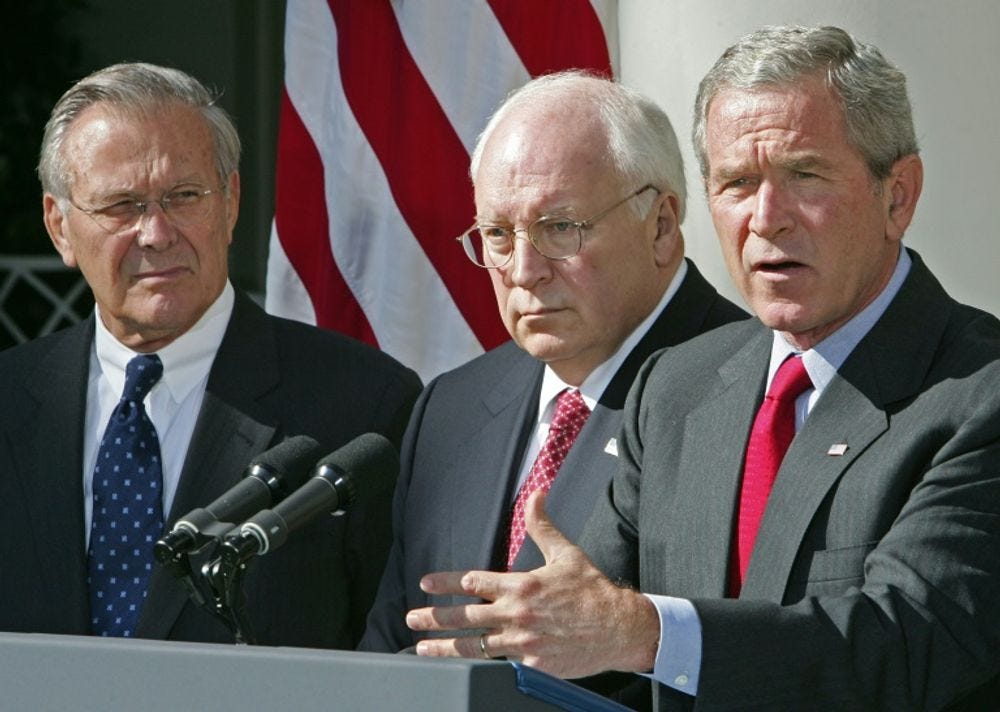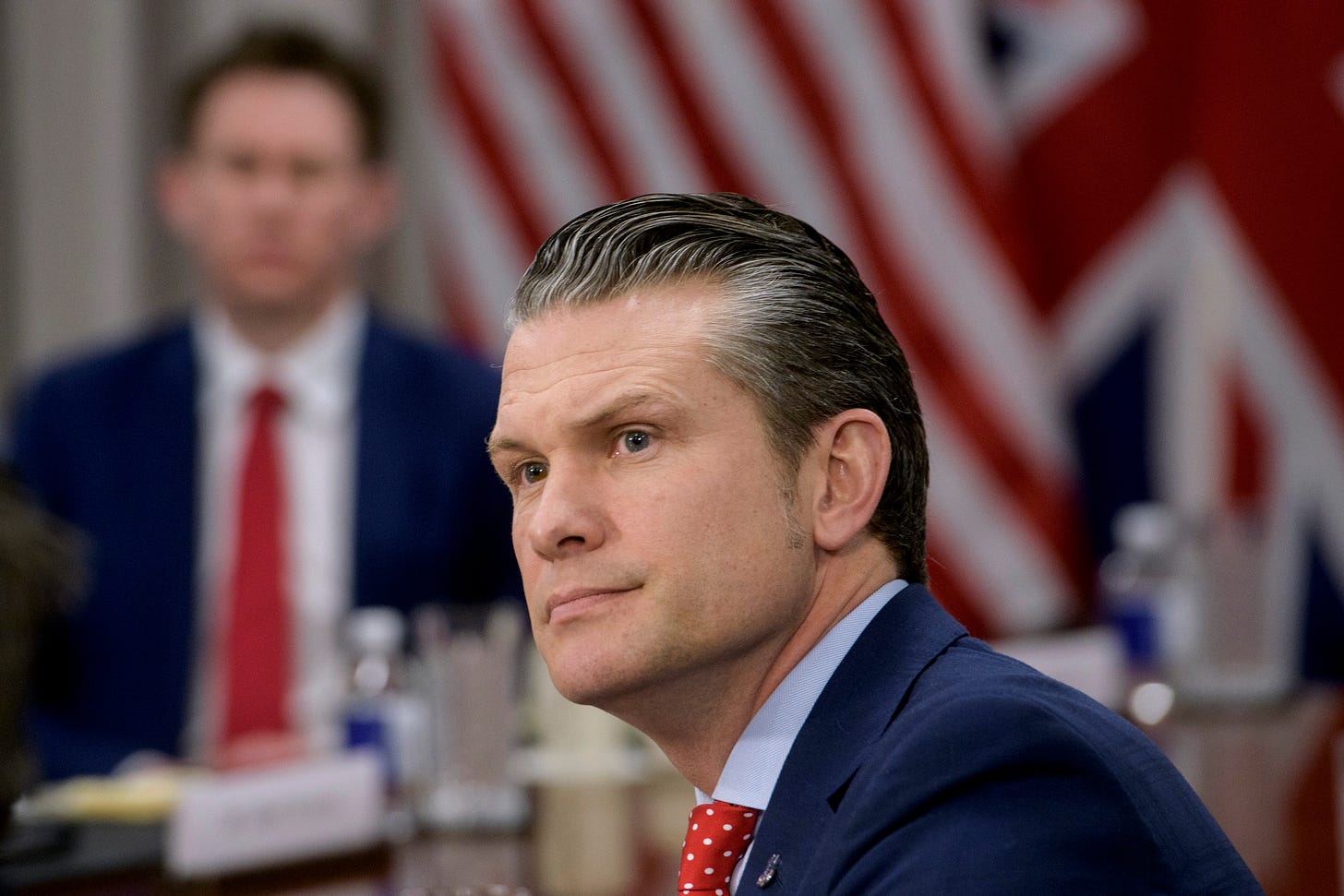The Growing Divide on Trump's Team
Conspiracy theorist's Oval Office meeting was just the beginning
The purge was swift and merciless. Half a dozen National Security Council officials were fired last week after far-right activist Laura Loomer presented President Trump with a dossier of their alleged infractions against Trump's "America First" agenda.
Loomer, who calls herself an “investigative journalist” and has been shunned by even conservative outlets like Fox News and Breitbart, was invited to the Oval Office to present Trump with her "opposition research" on NSC officials whom she deemed disloyal to Trump's foreign policy vision.
She was reportedly "furious" that "neocons" had "slipped through" the vetting process, and she apparently wanted them gone.
Neoconservatism began during the 1960s, but reached a peak during the George W. Bush presidency. It’s an ideology that marries free market capitalism with a “peace through strength” interventionist foreign policy bent that believes that the US is better off when democracy is promoted around the world. As the Democratic party became increasingly pacifist, some of the hawks of the party defected, finding they no longer aligned with those that had a D behind their name. But neither were they as far to the right as some of the existing conservatives in the Republican party – they were a new kind of conservative, a “neocon.”
National Security Adviser Mike Waltz himself narrowly escaped being fired – surviving not because of confidence in his policies, but because Trump wanted to deny his critics the satisfaction of a high-profile firing that would generate negative media coverage. As populist firebrand Steve Bannon, Trump's former chief strategist, told Axios "we hate the globalist media even more than we hate neocons."
This West Wing bloodletting represents the latest battle in a war that has been raging inside Republican foreign policy circles since Trump's ascendance. The fault lines run deeper than personalities or partisan squabbles – they reflect a fundamental disagreement about America's place in the world.
As Danielle Pletka of the American Enterprise Institute wryly observed last year, we have been witnessing a clash between the "Neo-GOP" and the "OG -GOP" – "two GOPs living in one body... the ill-suited marriage of two worldviews that have little to do with each other, two sides who see America and the world completely differently."
A survey by the Chicago Council on Global Affairs, one of the more respected barometers of American public opinion on foreign policy, reveals this tension in stark numbers. Their 2024 poll found Republican support for an active American role in world affairs has rebounded slightly to 54 percent, up from a historic low of 47 percent in 2023 – but still dramatically below the 77 percent support recorded in 2002 and 2006. Even with the slight rebound in 2024, these numbers reflect a GOP increasingly skeptical of America's traditional alliance commitments. For a party that once championed global engagement under Ronald Reagan and both Bushes, this represents a seismic shift in worldview.
This bitter struggle ebbs and flows, but has most recently crystallized around Waltz himself – a former Green Beret who served as an advisor to former Defense Secretary Donald Rumsfeld under President George W. Bush and Vice President Dick Cheney, architects of the Iraq War.
To the party's "restraint wing," his background makes him suspect – a holdover from an era they would prefer to see in the rearview mirror and not the headlights. Though Waltz has gradually shifted his positions and attempted to align himself with Trump's more skeptical view of foreign entanglements, his establishment credentials have made him a lightning rod for criticism among the America First crowd.
The "restraint wing," championed by voices like Tulsi Gabbard, a former Democratic Congresswoman and now Trump's Director of National Intelligence, rejects the interventionist policies that have defined the world order for the past 40 years. Their vision prioritizes limited military engagements abroad, reduced foreign aid, and deep skepticism toward international alliances like NATO. America's interests, they insist, lie in focusing resources domestically rather than on distant military commitments.
On the other side stand the traditionalists – a coalition of defense hawks, internationalists, and free-trade advocates who see American leadership as indispensable to global stability. This wing, which dominated Republican foreign policy from Reagan through George W. Bush, views robust American engagement as both a moral imperative and a strategic necessity. They promote the belief in American exceptionalism – the idea that the United States has a unique role and responsibility to promote democracy and maintain global order.
Conservative commentator Dave Smith, a libertarian comedian who has become influential among the anti-interventionist right, captured their alarm at the shifting tide when he described Trump's selection of Marco Rubio, a longtime foreign policy hawk who has advocated strong stances against Russia, China, and Iran, as a "disaster," equating it to appointing arch-hawk Liz Cheney.
Defense Secretary Pete Hegseth, a Fox News host who describes himself as a "recovering neocon," embodies the uneasy middle ground many Republicans now occupy. "How much money have we invested, how many lives have we invested, and has it actually made us safer? Is it still worth it?" Hegseth asked in a 2020 interview with The New York Times, reflecting the growing disillusionment with two decades of military interventions that yielded few clear victories.
What makes this battle so consequential is that it's not merely about policy preferences – it's about America's very identity on the world stage. As the American Enterprise Institute's Matt Continetti told the #WTH podcast, the Republican introspection is pulling the party back toward its pre-World War II orientation – the economic protectionism, restricted immigration, and wariness of foreign entanglements that characterized the eras of Calvin Coolidge and Warren Harding in the 1920s.
The irony is that for all the talk of "America First" isolationism, Trump's own foreign policy has been more complicated. While he avoided new military entanglements during his first term – a point he proudly highlights – he also ordered the targeted killing of Iranian General Qasem Suleimani and struck Syria after chemical weapons attacks. He simultaneously threatened to abandon NATO while pushing its members to increase defense spending. This contradictory approach reveals the competing impulses within the party itself.
Both Waltz and Rubio have gradually shifted their positions over the years – sounding less like Dick Cheney or former National Security Adviser John Bolton and increasingly speaking the language of the "America First" movement. When Russia first invaded Ukraine in February 2022, both men applauded the rush to send arms and aid to the Ukrainians. Yet by this spring, each voted against the last major aid package to support Ukraine, with Rubio declaring that the United States could not afford to fight for Ukraine's freedom while illegal immigrants were coming over the southern border.
This existential struggle transcends the immediate drama of NSC staffing decisions or even the fate of Mike Waltz. It represents a crossroads for a party – and potentially a nation – deciding whether to embrace global leadership or retreat into a narrower conception of national interest.
Yet some Trump supporters believe the common narrative about this divide may itself be flawed. As Washington Post columnist Marc Thiessen wrote, citing a Reagan Institute study: "Conventional wisdom holds that the GOP is split into two factions: A Reaganite wing that still holds on to old ideas of US leadership on the world stage, and a populist MAGA wing that is deeply skeptical of U.S. global leadership and wants to retreat into a fortress America. That conventional wisdom is dead wrong."
The study found that self-identified MAGA Republicans are actually more supportive of NATO, more concerned about Chinese aggression toward Taiwan, and more likely to believe the U.S. should be "more engaged and take the lead" on foreign policy than their non-MAGA counterparts. A 51 percent majority of MAGA voters supported global engagement, compared to just 48 percent of non-MAGA Republicans.
This suggests the struggle isn't simply between isolationists and interventionists, but rather reflects more nuanced differences in how American power should be wielded. Trump voters, it seems, don't necessarily want America to withdraw from the world stage – they want America to engage on different terms, with clearer definitions of national interest and more demands placed on allies.
The direction Republicans choose may ultimately determine whether America remains the indispensable nation or cedes the international stage to eager rivals, creating a vacuum that adversaries like China and Russia stand ready to fill.
Trump's once-radical foreign policy views have become increasingly mainstream within the GOP. For a party that once venerated Reagan's call for America as a "shining city on a hill," the desire to focus more narrowly on domestic priorities represents a profound transformation – one that future historians may mark with the reign of Donald Trump.








We gave up our seat at the head of the world stage when trump got elected. They were willing to forgive an error in judgment once. Twice shows a lack of leadership and a high degree of ignorance that we can stand alone in a global society. Letting a nutcase like Loomer whisper in your ear, and then listen to her speaks volumes more than words can say. Trump is unqualified and the equivalent of a 10 year old being asked to pilot a 747. Its a disaster waiting to happen.
"A focus on domestic priorities"? What might those be? No taxes or regulations for the wealthiest while creating a slave class of elders, women, and minorities? Plundering the social wealth of education, health, retirement security, and personal freedom of everyday people so they'll be forced to support the elite class instead of those undesirable brown immigrants? Working until they die of formerly prevented diseases or a toxic food/ water/ air supply? When you imply MAGAs have an "America First" agenda without actually calling it out, you make them sound reasonably legit on policy direction vs. those pesky Neocons who want world order and financial dominance.